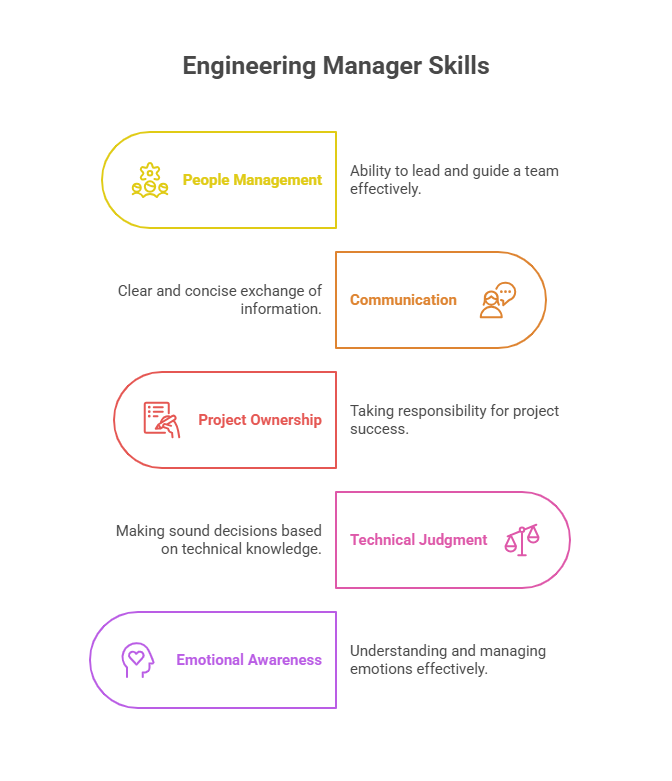Becoming a Software Engineering Manager isn’t just the next job title—it’s a shift in how you work, lead, and think. You go from building features to building teams. From solving code problems to solving people problems.
Engineering managers help companies deliver faster, build stronger teams, and make better decisions. They support engineers, drive projects forward, and align technical work with business goals. It’s a high-impact role, but it takes more than strong coding skills.
This guide breaks down everything you need to know: what the role involves, how to know if it’s right for you, and the exact steps to get there. Whether you’re a senior engineer thinking about the switch or already leading informally, you’ll find a clear path forward here. Let’s get started.
What Does a Software Engineering Manager Do?
A Software Engineering Manager leads a team of engineers and ensures they deliver quality work on time. They handle both people and projects, removing blockers, helping others grow, and keeping things on track. Their job is to create an environment where engineers can do their best work.
They spend a lot of time in meetings, planning work, giving feedback, and talking to other teams. Instead of writing code every day, they focus on big-picture problems: what the team is building, how fast it’s moving, and where help is needed.
Engineering managers also hire new engineers, run performance reviews, and coach team members. They work closely with product managers, designers, and other leaders to align goals and make better decisions. Their role is part leadership, part coordination, and part technical guidance.
Unlike a tech lead, who may still be hands-on with code, an engineering manager spends more time on people and process. They don’t solve every technical issue themselves—they make sure the team has what it needs to solve them.
In short, they guide the team, remove roadblocks, and help engineers grow while making sure the work gets done right. Next, let’s look at whether this path is a good fit for you.
Is Becoming an Engineering Manager Right for You?
Becoming an Engineering Manager means stepping away from solving problems on your own and focusing on helping others succeed. If you enjoy mentoring teammates, organizing work, and thinking about long-term goals, this role may fit you well.
You don’t need to be the most senior engineer or know every system inside out. What matters more is how you support others, handle conflict, and lead with clarity. You’ll spend more time in meetings than in code, so if team discussions and decision-making energize you, that’s a good sign.
Strong communication is key. You’ll work across teams, explain decisions clearly, and handle feedback from both engineers and leadership. If that sounds frustrating instead of rewarding, you may want to stay in an individual contributor path longer.
This role can be rewarding if you care about people and team success. But if writing code and solving technical puzzles is what drives you, management may feel like a poor fit.
Skills You Need to Become an Engineering Manager
To succeed as an Engineering Manager, you need a mix of leadership, communication, and technical judgment. Here are five key skills that matter most:

1. People Management
You’ll be responsible for your team’s growth, performance, and morale. That means setting clear goals, giving regular feedback, running 1:1s, and supporting career development. You need to recognize what each person needs to grow and help them get there.
2. Communication
You’ll talk to engineers, product managers, designers, and senior leaders—often in the same day. Clear communication helps avoid confusion, align priorities, and solve problems faster. You need to listen well, explain ideas clearly, and give honest, constructive feedback.
3. Project Ownership
Deadlines, blockers, and shifting priorities are part of the job. You need to keep work organized, plan sprints, and make sure the team delivers on time. Good project ownership means staying ahead of issues without micromanaging.
4. Technical Judgment
You don’t have to write code daily, but you should understand the work. You’ll be part of technical decisions, architecture discussions, and code reviews. This helps you guide the team, spot risks early, and ask the right questions.
5. Emotional Awareness
You’ll deal with tension, burnout, and team dynamics. Being aware of how people feel—and knowing how to respond—helps you lead with empathy and build trust. It also helps you spot small issues before they become big problems.
How to Become a Software Engineering Manager: Career Stages and Action Steps
Start by becoming a strong engineer, then build leadership experience step by step. Whether you’re early in your career or already a Senior or Staff Engineer, here’s how to move toward the Engineering Manager role.

1. Build a Strong Engineering Foundation
- Focus on writing clean, reliable code.
- Understand how your team works and contribute consistently.
- Learn from senior engineers and ask for feedback.
2. Take Ownership and Deliver Results
- Own features, fix critical issues, and step up when things get tough.
- Communicate clearly with your team and cross-functional partners.
- Show that you’re dependable and solution-oriented.
3. Lead Without the Title
- Start mentoring new engineers or interns.
- Lead planning sessions, run stand-ups, or own a small project.
- Take on coordination roles even if you’re not the manager yet.
4. Grow Your Soft Skills
- Practice giving feedback and listening well.
- Handle disagreements calmly and help others work through them.
- Communicate clearly in meetings, docs, and 1:1s.
5. Talk to Your Manager and Set a Plan
- Let them know you’re interested in leadership.
- Ask what skills or experience you’re missing.
- Work together on a development plan or transition timeline.
6. Step Into the Role
- In some teams, you’ll ease into management by covering for an EM or leading a sub-team.
- In others, you’ll apply for a new role internally or externally.
- Either way, be ready to shift your focus from code to people, delivery, and outcomes.
How to Prepare for Engineering Manager Interviews
Interviewing for an Engineering Manager role is different from technical interviews. You’re being assessed on how you lead people, make decisions, and handle tough situations, not just how well you understand code.
Here’s how to prepare effectively:
Understand What Interviewers Look For
Hiring teams want to see that you can:
- Lead a team and help people grow
- Handle conflict, feedback, and tough conversations
- Align engineering work with business goals
- Make smart technical trade-offs, even if you’re not coding yourself
- Communicate clearly across teams
Think through real examples from your past work where you showed these skills.
Practice Behavioral Questions
Expect questions like:
- “Tell me about a time you resolved a team conflict.”
- “How do you support underperforming engineers?”
- “How do you balance delivery speed with code quality?”
Use the STAR method (Situation, Task, Action, Result), but keep answers natural and direct. Don’t try to sound perfect—focus on what you learned and how you handled challenges.
Brush Up on Technical Discussions
You won’t need to whiteboard code, but you should be able to:
- Talk through system design decisions
- Review trade-offs in architecture or process
- Discuss how you support technical quality as a manager
If you’ve been away from hands-on work, review your team’s recent projects so you can speak about them with confidence.
Expect Role-Specific Scenarios
You may be asked to:
- Run a mock 1:1
- Prioritize a messy backlog
- Respond to a hypothetical team issue
These test how you think on your feet and show leadership under pressure. Think through how you’d act—not just what sounds right.
Ask Smart Questions
Good interviews go both ways. Ask about team structure, expectations, and how success is measured. This shows you’re serious and helps you find a good fit.
How to Succeed in Your First Engineering Manager Role
Your first few months as an Engineering Manager are about building trust, understanding your team, and learning how to lead without overstepping. Start with a steady mindset—observe, support, and stay open to learning.
First 90 Days
- Build trust with your team
Be consistent, transparent, and supportive. Follow through on what you say. Trust builds from actions, not titles.
- Listen more than you talk
Ask clear questions, then step back. Let your team speak freely. This helps you learn faster and builds respect.
- Understand team dynamics, tech stack, and goals
Get familiar with how your team works, where the blockers are, and what success looks like. The sooner you see the full picture, the better your decisions will be.
Pitfalls to Avoid
- Trying to solve everything yourself
You’re not expected to have all the answers. Step back so others can step up. Your job is to create space for the team to solve problems—not to fix everything yourself.
- Over-managing or micromanaging
Check in, but don’t hover. Give your team room to make decisions and learn. Trust leads to better performance than control.
- Neglecting team development
Don’t let day-to-day tasks push growth off the radar. Regularly check in on career goals, provide feedback, and open up new opportunities. A team that grows stays motivated and sticks around longer.
Continuous Growth as an Engineering Manager
Being a great manager isn’t a one-time achievement—it’s an ongoing process. As your team grows, the challenges change. Staying sharp means investing in your own learning and thinking about where you want to go next.
Learning and Development
Keep learning from others. Join EM communities, follow engineering leadership blogs, and attend meetups or internal leadership groups. Books and podcasts can help, but talking to peers often gives better context.
Find a mentor if you don’t already have one. Coaching can also help you work through challenges privately and improve faster.
Don’t completely lose your technical edge. You may not write code, but reviewing design docs, keeping up with your team’s stack, and learning new tools help you stay credible.
Career Progression Opportunities
As you gain experience, you can grow into roles like:
- Senior Engineering Manager
- Director of Engineering
- VP of Engineering
- CTO
Each step brings more responsibility—bigger teams, broader planning, and closer alignment with company goals.
You can also grow laterally. Many EMs shift into product, operations, or people roles, especially if they enjoy strategy or cross-functional work more than team delivery. It depends on your strengths and interests.
Conclusion
Becoming an Engineering Manager isn’t about getting promoted—it’s about choosing a different kind of impact. You stop measuring your success by the code you ship and start measuring it by the people you support, the teams you shape, and the outcomes you help deliver.
The shift is real, and it’s not for everyone. But if you’re ready to guide others, solve problems at the team level, and think beyond your own work, it can be one of the most rewarding steps in your career.
Start small. Lead where you are. Ask questions. Build trust. The skills that make you a strong manager aren’t learned all at once; they grow over time, through people, decisions, and real challenges.
You don’t need to wait for a title to begin acting like a leader. You just need to start showing up like one.




